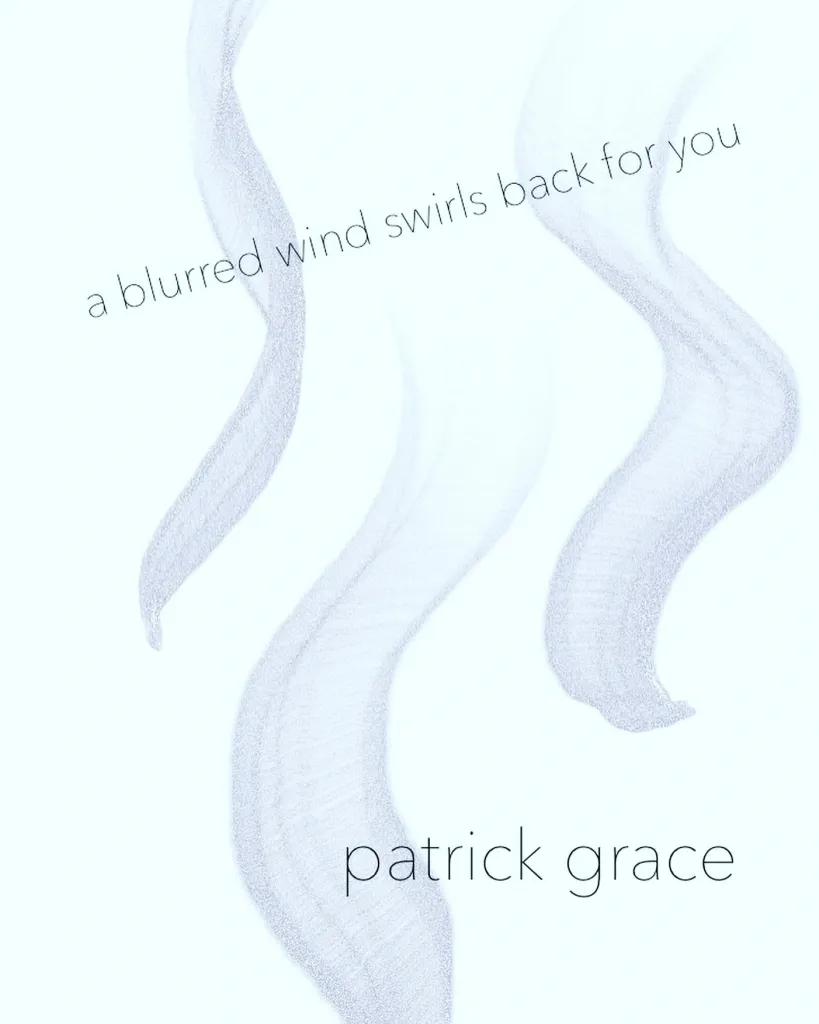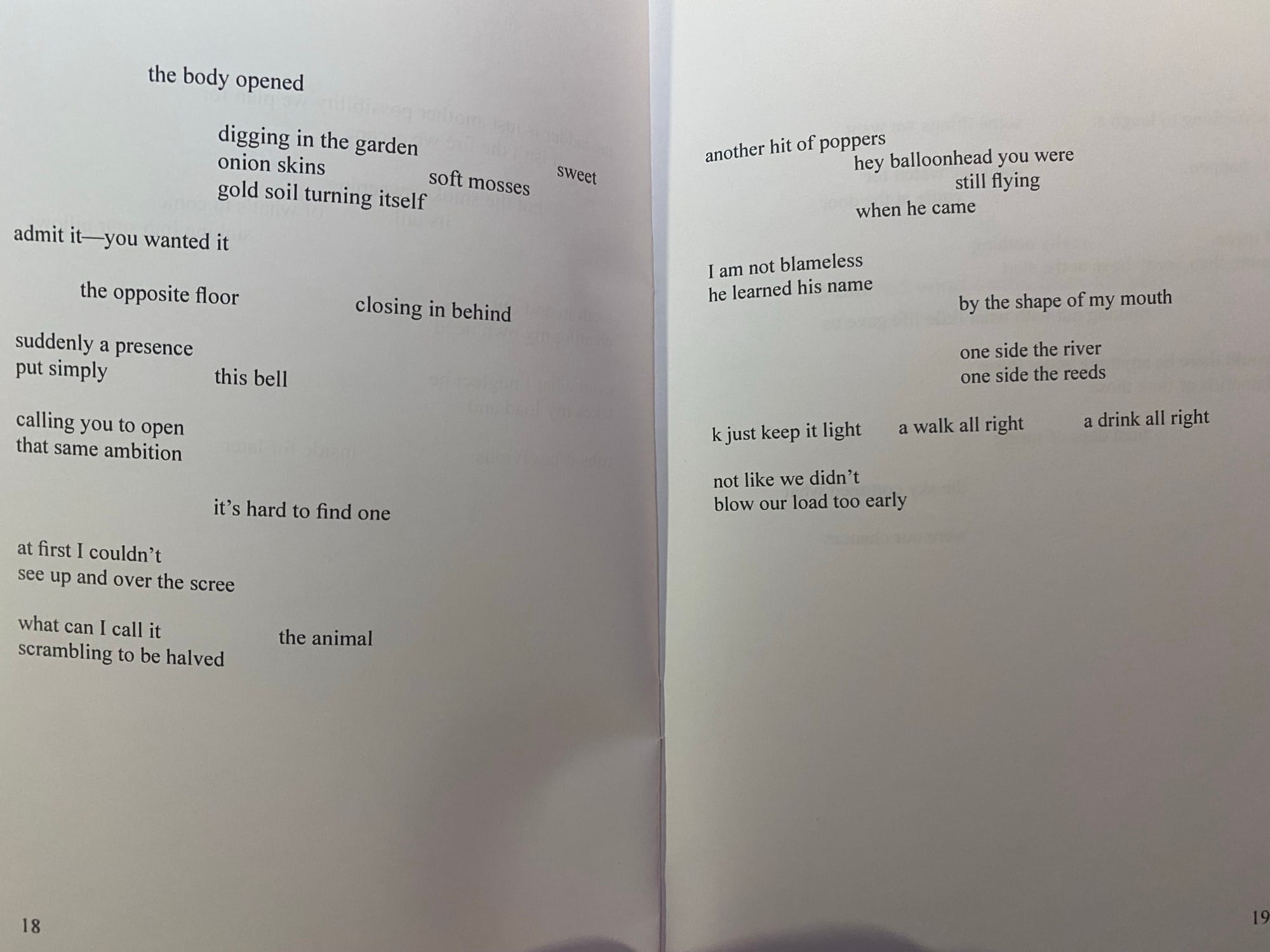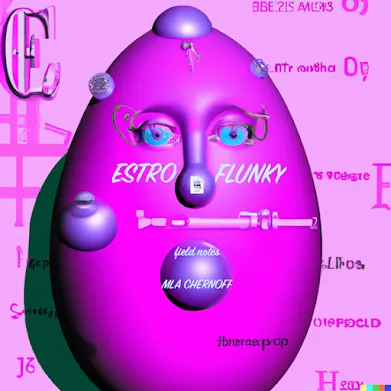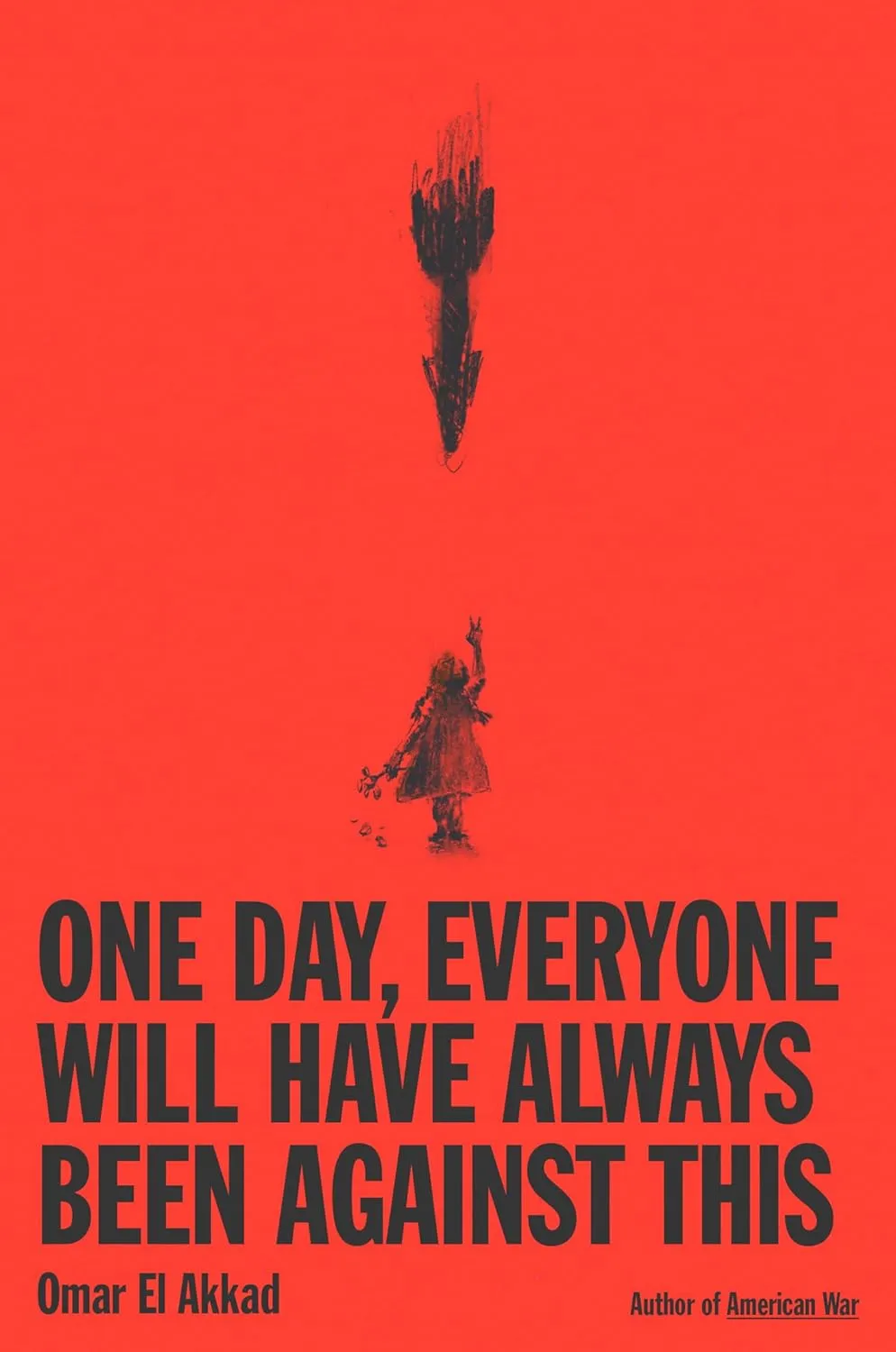Patrick Grace, a blurred wind swirls back for you
Patrick Grace caresses the line between romance and desire with long, knowing strokes.

A sense of relief.
It’s the end of the month, the elections are done, my taxes have been filed, the work week is half over and I am sitting in front of my machine for the thirtieth time this month with a poetry chapbook open spread-eagle under the weight of my mechanical keyboard to type this review you’re reading on your phone, tablet or computer now, on your toilet, your sofa, or standing eating something hovering around your kitchen sink.
The vibe is chill.
Thank you everybody reading this tonight, the morning after and extending outward to everybody following April 2025. I don’t think I have ever written as much as I have this past month.
The response has been overwhelming even if this site doesn’t get the same number of hits my former blog Literatured used to (yet), which speaks to the quality of the readership as much as it speaks to the attention I have deliberately dedicated to producing these reviews. Profoundly, and I mean this when I say it, thanks to each and every one of you.
Speaking of, my very fine folks—let’s get back to business, shall we?
Tonight’s chapbook is none other than Patrick Grace’s 2023 Turret House Press publication a blurred wind swirls back for you.
Wind can be an auspicious thing. The wind in your sails, a windfall of cash, or getting a second wind, all positive connotations. Judging by the title, we are in for a happy story.
The cover of the chap is designed by James Hawes and pictures three charcoal wisps that extend vertically in S-shapes behind the all-lowercase text of title and author name beneath it on a black and white print.
Patrick Grace is an author and teacher from Vancouver, BC. He is managing editor of Plenitude Magazine and has two other works, one a 2021 chapbook with Anstruther Press, Dastardly, the other, his 2024 début poetry collection with UAlberta Press, Deviant.
The first page of the chap appears centre top and simply reads:
a brazen thing
It sort of runs counter-narrative to the vibe of the evening, if not the title, no?
Then the first poem appears:
The first thing he did
with my number
was call
Ah, brazen. In that sense.
The poem continues the next two pages over (it’s 8 pages long until section II, in fact):
I mean who calls anyone anymore the art of speaking a brazen thing
lightning came lightning lit the night
it gave us an easy in
an ice
to break
The section ends with a devastating three lines, foreshadowing:
at the start when he shows you who he is, believe him
The second section is called the sky cottoned and gets more into the meeting of this unnamed supposed lover of the text, describing him as “leaning in jeans” with a “bright t-shirt,” “his boots where I stood,” but afterwards, the poem appears to dialogue with itself as though remembering the two speaking together in one voice “wanton you asked for it” or speaking hurriedly without Oxford commas to himself.
If the speaker of the poem echoes any of his lover’s words, it is without fondness or ownership: his lover’s words are what happened to him.
These poems are as intimate as they are erotic, yet as sparing as they are nebulous. Patrick Grace has really stayed true to his namesake.

Lines like “he learned his name / by the shape of my mouth” or “really nothing / more than horny boys at the start” bring back memories of reading Montreal francophone poet Jean-Paul Daoust and his 111, Wooster Street (1996), which features similar enrapturings of tension and intimacy throughout an odyssey of poems deeply steeped in the gay culture of nineties’ New York.
Daoust didn’t have the sole focus of one lover as Patrick Grace does in his book, but Patrick Grace manages to achieve so much more with less.
The third section is the eponymous third (not to be confused with polyamorous third), a blurred wind swirls back for you.
Maybe I am reading too much into things, but there is a deep undertone of romantic sweetness to the tactical raunchiness taking place here. It can’t just be me, right?
Patrick Grace caresses the line between romance and desire with long, knowing strokes.
This is the section where it all seems to fall apart for the speaker of the poem, at a birthday dinner night out with 10-20 “close” friends, heartbreakingly:
when he shows you who he is, believe him inviting friends to sit on his lap heady heavy hands in their hair a little kissy too they all go for it his charm
I am not entirely clear how the poem ends. Not that I didn’t finish reading it, but that it deliberately isn’t made clear.
The protagonist narrating seems to suggest he’s unsafe, there’s a premonition of a hospital room, and running (was he roofied? “somewhere in the dark I / lose my keys it grows difficult / to speak to undo the last // hours,” “lumber legs,” “swollen road”), and hypothetical rhetorical questions such as “who will dig him out of this / one if not me turning his // empty glass to the clear / side of commitment.”
Too much booze, too much sex, too much danger, and no commitment anywhere in sight. That seems to be the fitting final visual metaphor given by the words above.
While his lover was never unequivocal, he was playing too cool, too close to the sun, when it all comes undone.
People throw around the word “situationship” so much these days, they miss the tragic poetry lingering just behind its spaghetti western cheapness.
In this case, if I were to go ahead and solve the puzzle, I would say the lover was the empty glass, and our hero was the blurred wind. But you probably already guessed it.
James Hawes needs to publish more queer poetry now. I mean, he already does, but he also needs to keep doing what he has been doing, which I entirely expect him to. Still though...
Alas! It reminds me of a Hi-Gloss song, well before my time (I’ve been listening to more vinyl lately), You’ll Never Know:
Hi-Gloss, You’ll Never Know (1981)
Nothing but the best for you would do
My love was vintage wine
Now you're just a memory
You're gone from me
Just so much wasted time
You can rest assured that I won't cry (Look what you have gone and done, when the best was yet to come)
For tears were never quite my style
I stopped crying long ago (What a childish game to play)
With life erased forever from my mind (And you threw it all away)
And on that note, I implore you to enjoy the poems of Patrick Grace in your nearest future.
Thank you, for the last time this month, for reading.
Bibelotages Newsletter
Join the newsletter to receive the latest updates in your inbox.



